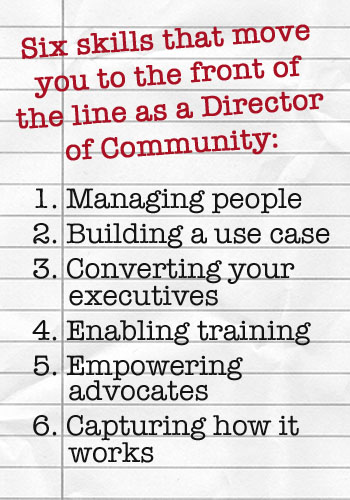You may run an online community – but to own an online community program, you need to add some skills to your toolset.
“Great player. Couldn’t cut it as a coach.”
“She was such a great reporter – but I hate her as an editor.”
“Man, I can’t believe his startup crashed and burned like that. He was so good…”
In every business – there’s the stereotype. You’re great at what you do – so you get promoted. You get a new office. You get a pay bump. And often, you fail miserably. That’s because the skills that make you good at what you do are often not at all the same skills to make you good at managing people who do what you do.
That’s the case in community management, too. The Community Careers and Compensation research highlights that Directors of Community and Community Managers share a role in community – but the specifics take them in very different directions. Community managers focus on what goes on in the community – content, engagement and community strategy. As a director, though, you don’t own the community – you own a community program, and need to prioritize building, promoting and connecting community to the business, and need to manage the community as a cost center.
The manager sits at the edge of the community and looks into it. The director sits on the edge and looks out from it. So if you’re a community manager with an eye toward growing your career, what do you need to think about?
Here are six skills that move you to the front of the line as a Director of Community.
 Managing people – Not a shocker here, but directing community should (unless you are building to your first hires) involve managing a team of community professionals. What makes a good team? What skills do you need? What skills do you have on board? How will you support your team’s continued growth? Having a system to know what you have, hire what you need and grow what you can is critical.
Managing people – Not a shocker here, but directing community should (unless you are building to your first hires) involve managing a team of community professionals. What makes a good team? What skills do you need? What skills do you have on board? How will you support your team’s continued growth? Having a system to know what you have, hire what you need and grow what you can is critical.
Building a business case – Thinking about your community strategy is critical, and as a director-level hire, you need to think about how the community works in the business context. Defining the value of community – and the shared value upon which you can connect members and the organization, is important. From there, you need to understand the community benefit in business terms. What’s the ROI? How can you demonstrate that community gets into making your organization a more effective business?
Converting your executives – Executive engagement is a powerful force in community success, but too often, we set unrealistic expectations for converting executives from skeptics to believers. (How many of your members at any level go from disinterested to community leaders, anyway?) Being able to strategically explain the value of community to your executives and other stakeholders can get them on board. Using a system like The Social Executive framework can help you pique their interest, show them the opportunity and get them to see the value.
Enabling training – You’re not just a teacher and evangelist, you’re head of curriculum for a community training program. Developing training that gets new members into and engaged with the community can be a daunting challenge, and in most communities, training is too big to handle alone. Creating a learning mindset and preparing advocates and trainers to help put your system into action is a critical and valuable business skill.
Empowering advocates – As a Director of Community, you’re likely in an organization with the opportunity to build a robust advocacy program for your most important members. What do you do to build that program, and get your most active and important community members to scale your community management efforts while giving them real value for their contributions?
Capturing how it works – Getting stakeholders engaged in community strategy? That may be the easy part. The challenge after that point is developing your roadmap and benchmarking your programs, so you can compare where your community is now to where you want it to be – and then figure out how to move it forward.
Of course, as a community manager, you have a leg up. Your job has been dealing with people – but you have a new set of “customers” in a Director role. Being able to translate what you do as a manager can help get you hired – and being able to turn that into practice can make you a success.
—
 TheCR is pleased to offer a guided course in Community Program Essentials to help you take the skills you have built within communities and apply them to making community a stronger part of your organization. The 8-week course starts April 26, and gives you a cohort of peers and weekly office hours in addition to self-paced video lessons and worksheets you can use to put the course ideas into practice. It’s an opportunity for Community Managers looking for their next role, and for Directors of Community to hone their skills. Click here to learn more!
TheCR is pleased to offer a guided course in Community Program Essentials to help you take the skills you have built within communities and apply them to making community a stronger part of your organization. The 8-week course starts April 26, and gives you a cohort of peers and weekly office hours in addition to self-paced video lessons and worksheets you can use to put the course ideas into practice. It’s an opportunity for Community Managers looking for their next role, and for Directors of Community to hone their skills. Click here to learn more!

